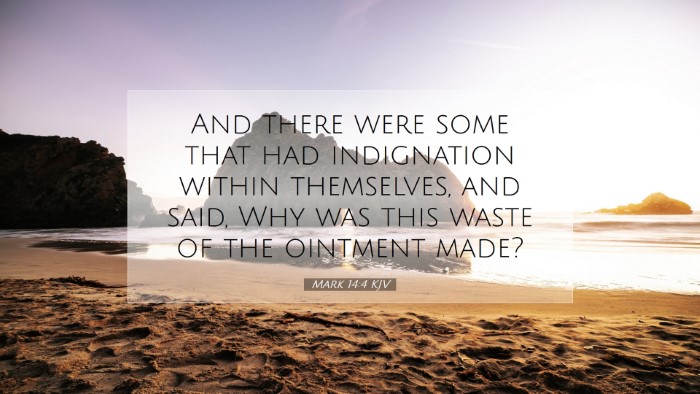Commentary on Mark 14:4
Mark 14:4 states, "And there were some that had indignation within themselves, and said, Why was this waste of the ointment made?" This verse speaks to a significant moment during the events leading up to the crucifixion of Christ, encapsulating human attitude towards devotion, sacrifice, and the nature of true worship.
Contextual Overview
This passage occurs shortly before Jesus' crucifixion during a dinner at Simon the leper's house in Bethany. It is crucial to note the atmosphere filled with tension, where Jesus’ impending death loomed ahead. The action of a woman anointing Jesus with precious ointment sets the stage for a profound lesson on value and worth in the kingdom of God.
Insights from Public Domain Commentaries
Matthew Henry's Commentary
Context of the Anointing: Matthew Henry provides a detailed exposition of the incident, noting that the act of anointing was not just a physical expression but an act filled with deep spiritual significance. The woman poured costly ointment, a gesture that signifies both love and honor for Jesus.
Indignation of the Disciples: The "indignation" mentioned in the text demonstrates a stark contrast between human reasoning and divine perspective. Henry emphasizes that those who criticized the woman harbored a misunderstanding of the worth of Jesus. They equated the value of the ointment in purely monetary terms, failing to recognize Jesus' divine worth and the appropriateness of the worship rendered.
Albert Barnes's Notes
Critique of the Waste: Albert Barnes frames the criticism of the disciples as rooted in a misunderstanding of true worship. He remarks that any act of sincere devotion to Christ is never wasted. The idea of 'waste' is clarified; while some may regard luxury or extravagance in worship as unnecessary, the biblical perspective credits such acts with profound honor and reverence before God.
Lessons on Value: Barnes elaborates that this incident challenges the reader to reconsider what constitutes true value. By prioritizing the dignity of Christ above material considerations, believers are encouraged to assess their own acts of worship, aligning them with the worthiness of the one they worship.
Adam Clarke's Commentary
The Cultural Context: Adam Clarke provides insight into the cultural background of extravagant expressions of gratitude and love within the Jewish tradition. Anointing was, and is, a deeply seated custom that illustrates honor not only towards individuals but God as well.
Rebuke and Response: Clarke points to the fact that, though the disciples' indignation appears justified from a human standpoint, the response of Jesus rectifies this misunderstanding. Clarke emphasizes that the woman’s devotion was memorialized by Christ, contrasting temporal beliefs regarding value with the eternal significance of acts of worship.
Theological Implications
This incident carries profound theological implications that resonate with pastors, students, and theologians:
- Worship Beyond Costs: True worship transcends material costs, echoing the principle that heartfelt devotion towards God often surpasses human calculations of worth.
- Divine Recognition: The Lord Jesus acknowledges acts of sincere worship, presenting them as exemplary, irrespective of human critique. This serves as an assurance that God values what the world often dismisses.
- Challenge to Hypocrisy: The narrative challenges believers to reflect on their approach to worship; are we discerning spectators, or are we engaged, sacrificial worshippers willing to give generously?
Practical Applications
The context and lessons drawn from Mark 14:4 encourage practical applications for Christian living:
- Encouragement to Worship: Believers are encouraged to express their love for Jesus freely, understanding that such expressions, no matter how extravagant, are not only welcomed but cherished in the heavenly realm.
- Self-Examination: Christians are led to self-examine their attitudes toward worship and sacrifice, challenging the tendency to judge the actions of others while neglecting their own coveted comforts.
- Value of Devotion: This passage invites reflection on how one allocates time, resources, and talents in service to God, urging believers to consider how lavishly they invest in their relationship with Him.
Conclusion
Mark 14:4 serves as a pivotal reminder of the true essence of worship and the heart's posture towards Christ. As we glean insights from the public domain commentaries of Matthew Henry, Albert Barnes, and Adam Clarke, we are reminded that extravagance in devotion is not waste, but an honoring of the One who gave His all for us. In the larger narrative of Mark's gospel, this act of adoration amidst impending suffering poignantly illustrates the call to seek the presence of God with an unwavering heart, prioritizing His worth above societal viewpoints.


